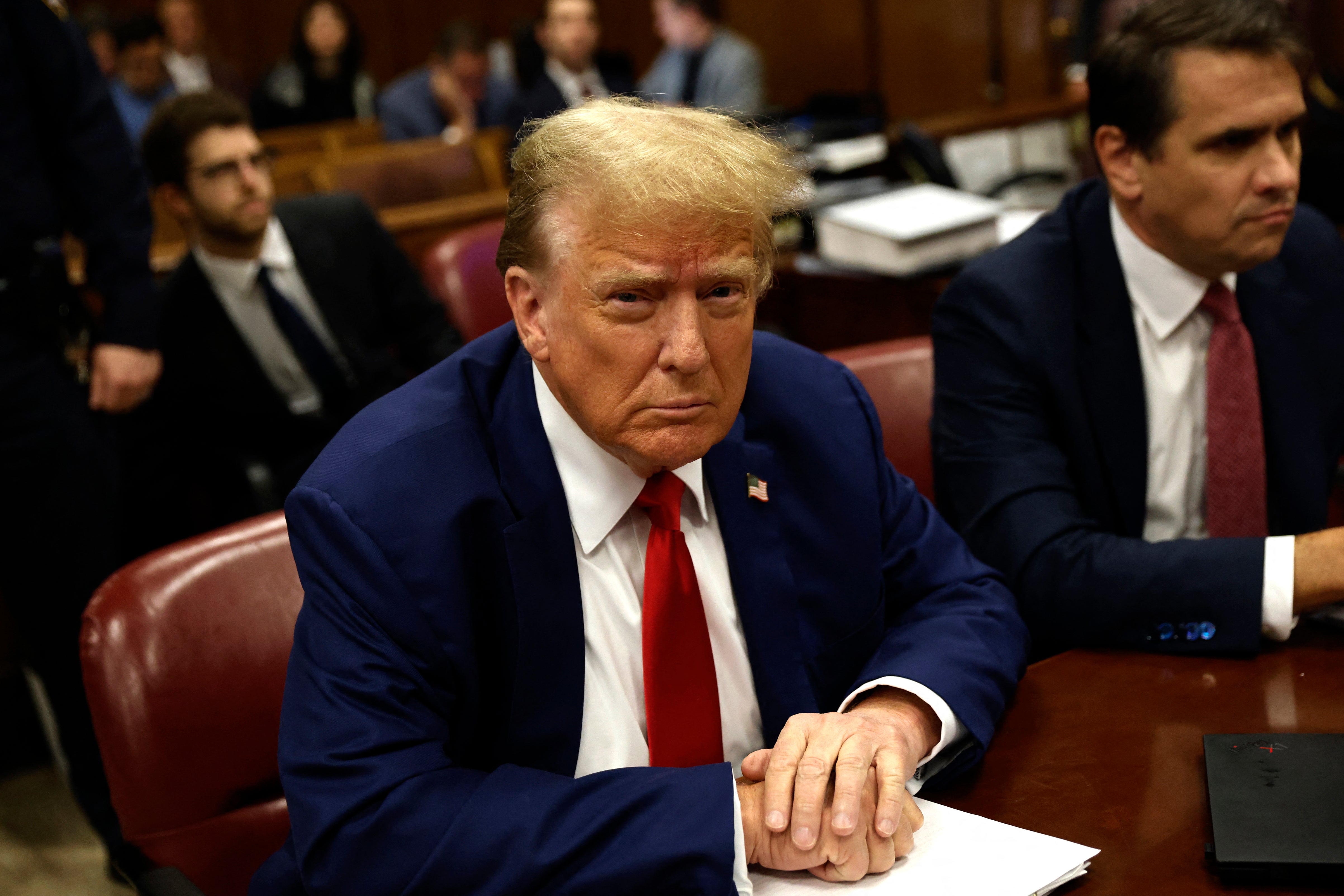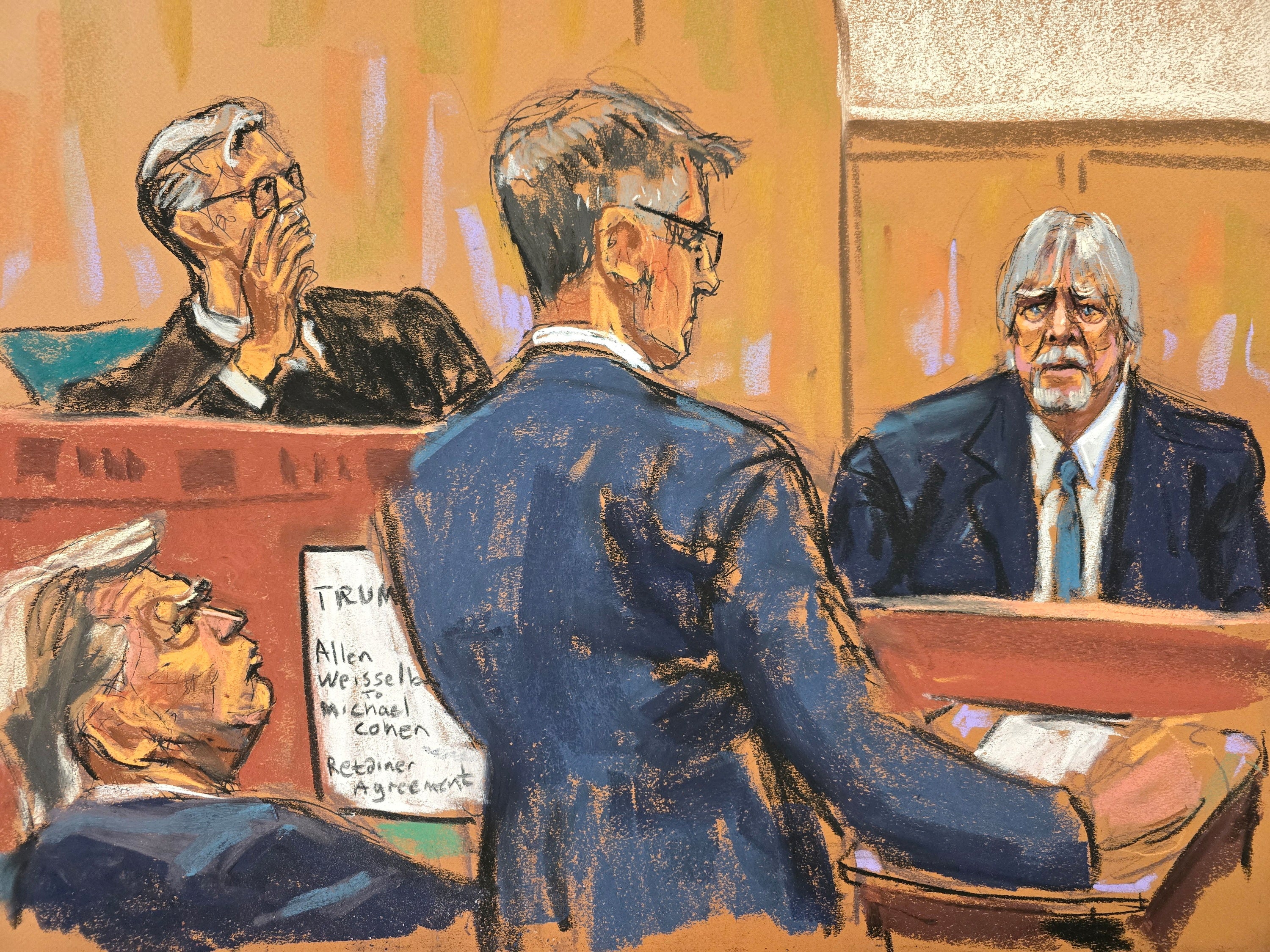Trump used personal checking account to pay Michael Cohen for Stormy Daniels hush money, trial hears
Jurors saw Trump’s signed checks to Cohen that included reimbursements for his payments to the adult film star
Jurors in Donald Trump’s hush money trial finally got to see the paper trail for payments to Michael Cohen for buying the silence of adult film star Stormy Daniels, whose story about a sexual encounter with Mr Trump allegedly threatened to derail his 2016 presidential campaign.
Those payments included checks bearing the former president’s Sharpie-inked signature, according to documents shown in a Manhattan courtroom on Monday.
A bulk of those monthly $35,000 checks – sent to Cohen during Mr Trump’s first year as president – came out of Mr Trump’s own personal checking account.
After two weeks of witness testimony that exposed the inner workings of tabloid publishing and behind-the-scenes damage control around Mr Trump’s 2016 campaign, Manhattan prosecutors gave jurors a detailed view of the allegedly “falsified” business records that are at the heart of the case.
Two longtime Trump Organization employees – including one of Mr Trump’s co-defendants in his sprawling civil fraud case – testified for nearly six hours on Monday, providing an exhaustive overview of the Trump Organization’s accounting for Cohen’s payments.
Mr Trump is charged with 34 counts of falsifying business records by disguising payments to his former attorney as “legal expenses” across Trump Organization records. Those checks – sent in $35,000 increments over 12 months – included an additional bonus and other funds, including money intended to reimburse his $130,000 payment to Ms Daniels in 2016, according to prosecutors.

On the bottom of a bank statement that notes the withdrawal of $130,000 to Ms Daniels’ attorney in October 2016, then-Trump Organization chief financial officer Allen Weisselberg scribbled the rough math for Cohen’s reimbursements, according to documents shown in court.
Now-former Trump Organization executive Jeffrey McConney wrote his own notes on a notepad with Trump Organization letterhead, writing that Cohen will receive $35,000 per month beginning 1 February, 2017. The bottom of the note adds “Mike to invoice us.”
"[Weisselberg] said, ‘we have to get some money to Michael,’” Mr McConney said on Monday. “I started taking notes on what Allen said.”
Throughout 2017, Cohen would email his invoice monthly to Weisselberg, who forwarded the message to Mr McConney, who would forward the invoice to accounts payable supervisor Deb Tarasoff.
She would then cut the checks, staple them to the original invoice, and walk them over to Mr Trump’s executive assistant for his signature, or mail them to the White House.
After Mr Trump’s inauguration in January 2017, the checks would be mailed to Mr Trump by FedEx, and he would sign them from Washington DC.
Mr Trump or his sons were the only people allowed to approve paying invoices of more than $10,000, and Mr Trump was the only person who authorized checks from his personal account, according to Ms Tarasoff.
In the trial’s opening statements, defence attorney Todd Blanche claimed that those payments were merely “for legal services rendered.” The invoices were processed, “somebody at Trump Tower” signed off on them, and they were recorded as such in a ledger, he argued.
“What on earth is a crime? What is a crime about what I just described?” Mr Blanche said last month. “The 34 counts … are really just 34 pieces of paper.”
Those 34 counts include not just the checks but the ledger entries and invoices that created them.
Cohen submitted each invoice “pursuant to the retainer agreement.” Pay stubs to Cohen described each check as payments for his “retainer.” Invoices entered into the company’s accounting software list each payment as a “legal expense.”
Ledgers from Mr Trump’s personal checking account and the Donald J Trump Revocable Trust – which handled the former president’s assets while he was in office – recorded the payments to Cohen as “legal expense,” according to documents shown in court.
Cohen’s first check, which encompassed January and February 2017, totalled $70,000.
That check, which came out of the trust’s checking account, was signed by Weisselberg and Eric Trump.

In a remarkable moment at the end of his testimony, Mr McConney agreed with prosecutors that he was “in the dark” about arrangements between Trump, Cohen and Weisselberg, who was allegedly looped into the scheme.
“This was all happening above your head?” Assistant District Attorney Matthew Colangelo asked him. “You were told to do something and you did it?”
McConney said yes to both.
The paper trail of Cohen’s payments was previously used as evidence of federal campaign finance violations as part of his plea agreement with federal prosecutors in 2018. In that case, Cohen agreed that he sent monthly invoices as part of a “retainer agreement” that didn’t exist, “and the monthly invoices [he] submitted were not in connection with any legal services he had provided in 2017.”
Bookmark popover
Removed from bookmarks